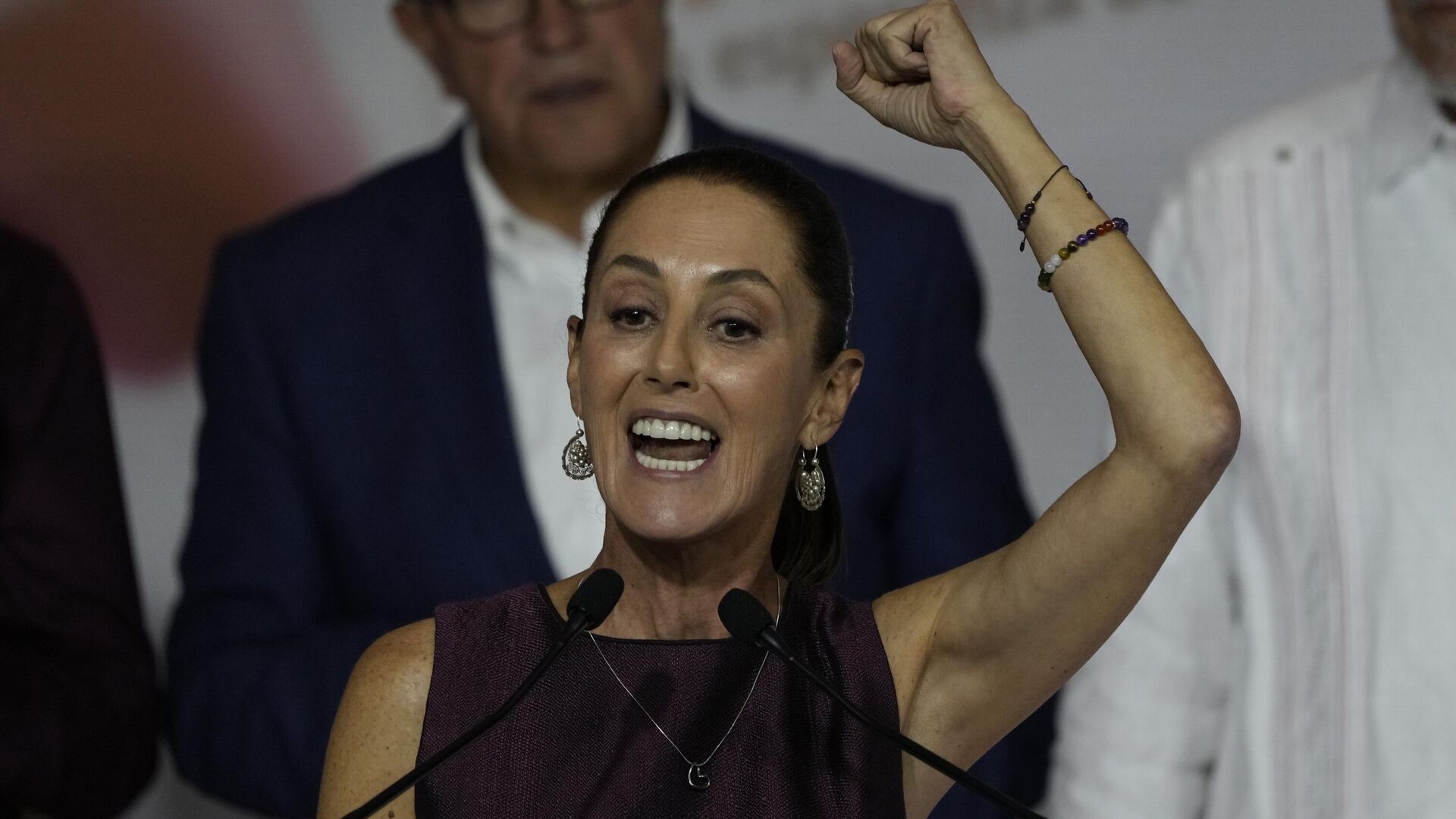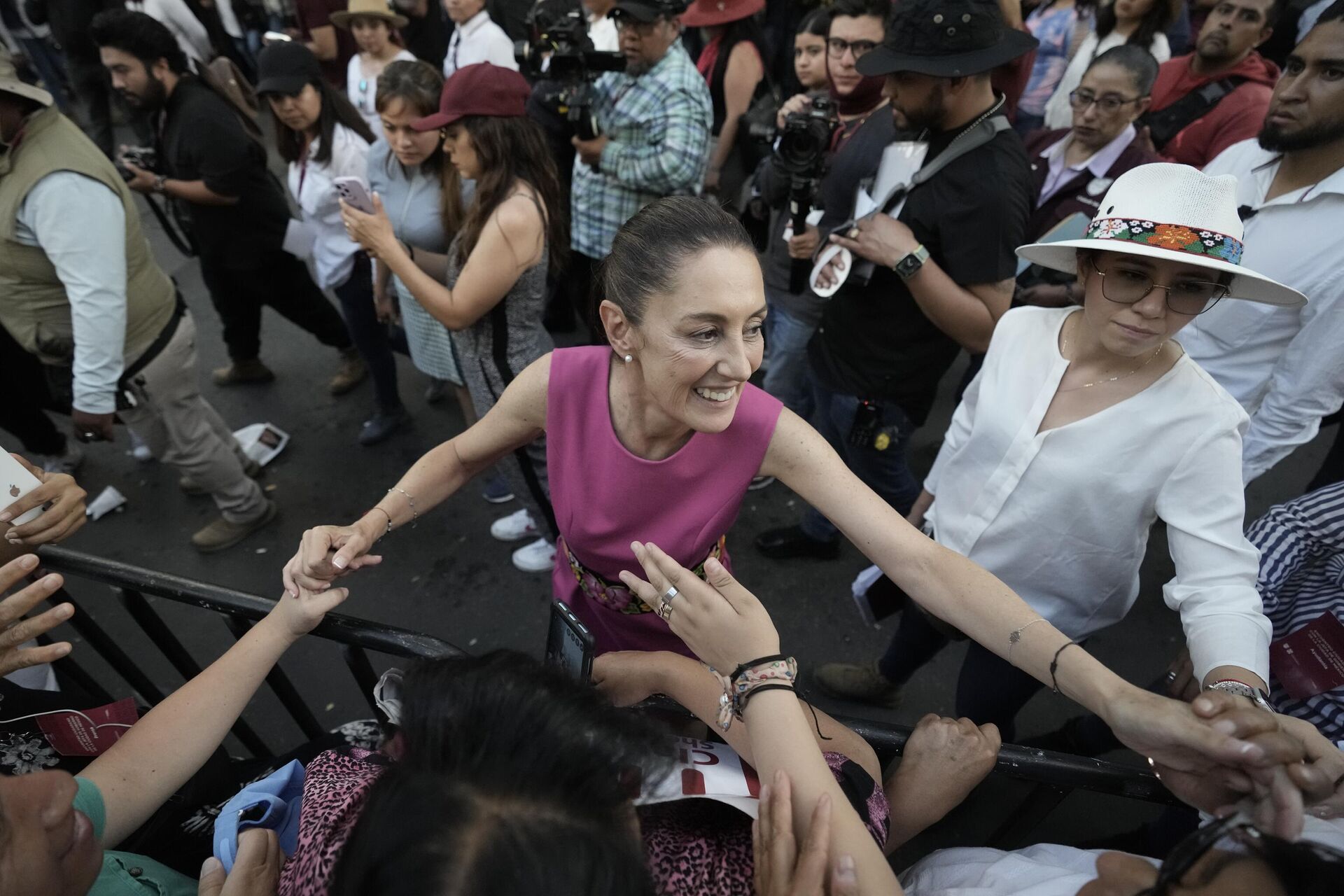https://sputnikglobe.com/20230922/meet-claudia-sheinbaum-the-nobel-laureate-set-to-become-mexicos-first-female-president-1113572234.html
Meet Claudia Sheinbaum, the Nobel Laureate Set to Become Mexico’s First Female President
Meet Claudia Sheinbaum, the Nobel Laureate Set to Become Mexico’s First Female President
Sputnik International
A recent survey shows progressive candidate Claudia Sheinbaum in pole position to win the Mexican presidency in 2024, becoming the first woman to occupy the National Palace.
2023-09-22T00:37+0000
2023-09-22T00:37+0000
2024-03-28T12:40+0000
americas
mexico
vicente fox
nicolás maduro
mexico city
institutional revolutionary party (pri)
national autonomous university of mexico
presidential election
https://cdn1.img.sputnikglobe.com/img/07e7/09/16/1113572076_0:178:3009:1870_1920x0_80_0_0_3cb6eb2c071f5c6b9d1007eb1e6fe555.jpg
A recent survey shows progressive candidate Claudia Sheinbaum in pole position to win the Mexican presidency in 2024, becoming the first woman to occupy the National Palace.The poll, published in the El País newspaper, shows Sheinbaum with the support of 47% of voters, well above her next-closest competitor Xóchitl Gálvez who leads a conservative coalition of parties with 30% support. The survey shows Sheinbaum consolidating sufficient support to win the election following a brief controversy around her party’s nomination process earlier this month.Sheinbaum’s victory next year would represent a break with tradition in a number of ways. While becoming the country’s first female leader, her background would also make her fairly unique: she’s a Nobel Prize-winning scientist who before entering local government in Mexico City was an engineering professor at the National Autonomous University of Mexico.She followed in the footsteps of her parents, themselves both academics, by studying physics at the university, which is known as a locus of left-wing organizing in the country. Her Nobel Prize-winning research, conducted in 2007 with members of the UN’s Intergovernmental Panel on Climate Change, focused on energy efficiency in buildings and transportation in Mexico.If elected, Sheinbaum would also be the country’s first Jewish president. Her fraternal grandparents hailed from Lithuania while her mother’s family came from Bulgaria, immigrating to Mexico in the 1940s during the Holocaust.Her ancestry became an issue in the highly-Catholic country when ex-President Vicente Fox disapprovingly referred to her as a “Bulgarian Jew,” calling her opponent Gálvez “the only Mexican” in contention for the presidency. He apologized for the comment, while Sheinbaum’s campaign responded on the X platform by declaring she is “more Mexican than mole!”Sheinbaum would join former presidents Janet Jagan of Guyana, Ricardo Maduro of Honduras, and Pedro Pablo Kuczynski of Peru as Jewish leaders to hold their countries’ highest office in Latin America (current Venezuelan President Nicolás Maduro also claims Jewish ancestry).Her election to the presidency would burnish the feminist credentials of López Obrador’s left-wing nationalist Morena party – the firebrand president has sometimes clashed with activists, once dismissing feminist critics as “conservatives.” Feminists have urged the president to do more to fight violence against women in a region where cultural ‘machismo’ has long been identified as a concern.Meanwhile, women’s activists have achieved victories in Mexico’s courts with the country’s Supreme Court voting to decriminalize abortion throughout the country earlier this month.Though sometimes displaying a curious sympathy for former US President Donald Trump, López Obrador’s presidency has been marked by attempts to establish greater independence from the United States.The populist leader has sued gun manufacturers in US courts and denounced his northern neighbor’s interventionist policies in the region. Recently, he urged Americans to vote against Florida Governor Ron DeSantis in the upcoming Republican presidential primaries, criticizing his passing of anti-immigrant legislation.López Obrador’s 2018 election to the Mexican presidency was a watershed moment in a country where decades of political domination by the Institutional Revolutionary Party (PRI) caused Peruvian writer Mario Vargas Llosa to refer to it as a “camouflaged dictatorship.” In recent years, the party’s lock on the presidency was broken with the election of Fox in 2000, but López Obrador’s left-wing presidency is considered the first ideological break with the PRI’s conservative governing ideology.
americas
mexico
mexico city
Sputnik International
feedback@sputniknews.com
+74956456601
MIA „Rossiya Segodnya“
2023
Sputnik International
feedback@sputniknews.com
+74956456601
MIA „Rossiya Segodnya“
News
en_EN
Sputnik International
feedback@sputniknews.com
+74956456601
MIA „Rossiya Segodnya“
Sputnik International
feedback@sputniknews.com
+74956456601
MIA „Rossiya Segodnya“
claudia sheinbaum, nobel laureate, nobel prize, mexico presidential election, first female president for mexico
claudia sheinbaum, nobel laureate, nobel prize, mexico presidential election, first female president for mexico
Meet Claudia Sheinbaum, the Nobel Laureate Set to Become Mexico’s First Female President
00:37 GMT 22.09.2023 (Updated: 12:40 GMT 28.03.2024) Polling shows the Jewish candidate on track to win the Mexican presidency next year with 47% support, continuing left-wing Morena rule.
A recent survey shows progressive candidate Claudia Sheinbaum in pole position to win the Mexican presidency in 2024, becoming the first woman to occupy the National Palace.
The poll, published in the El País newspaper, shows Sheinbaum with the support of 47% of voters, well above her next-closest competitor Xóchitl Gálvez who leads a conservative coalition of parties with 30% support. The survey shows Sheinbaum consolidating sufficient support to win the election following
a brief controversy around her party’s nomination process earlier this month.
Sheinbaum’s victory next year would represent a break with tradition in a number of ways. While becoming the country’s first female leader, her background would also make her fairly unique: she’s a Nobel Prize-winning scientist who before entering local government in Mexico City was an engineering professor at the National Autonomous University of Mexico.
She followed in the footsteps of her parents, themselves both academics, by studying physics at the university, which is known as a locus of left-wing organizing in the country. Her Nobel Prize-winning research, conducted in 2007 with members of the UN’s Intergovernmental Panel on Climate Change, focused on energy efficiency in buildings and transportation in Mexico.
If elected, Sheinbaum would also be the country’s first Jewish president. Her fraternal grandparents hailed from Lithuania while her mother’s family came from Bulgaria, immigrating to Mexico in the 1940s during the Holocaust.
Her ancestry became an issue in the highly-Catholic country when ex-President Vicente Fox disapprovingly referred to her as a “Bulgarian Jew,” calling her opponent Gálvez “the only Mexican” in contention for the presidency. He apologized for the comment, while Sheinbaum’s campaign
responded on the X platform by declaring she is “more Mexican than mole!”
Sheinbaum would join former presidents Janet Jagan of Guyana, Ricardo Maduro of Honduras, and Pedro Pablo Kuczynski of Peru as Jewish leaders to hold their countries’ highest office in Latin America (current Venezuelan President Nicolás Maduro also claims Jewish ancestry).
Sheinbaum burnished her reputation in Mexico as a politician concerned with fighting crime and corruption during her time as mayor of the country’s capital. During her presidential campaign she has promised to continue cash payments to poor Mexicans and further the country’s energy independence from the United States.
Analysts speculate she would bring a more environmentalist focus to the office than her predecessor Andrés Manuel López Obrador, who currently enjoys an approval rating around 65%.
Her election to the presidency would burnish the feminist credentials of López Obrador’s left-wing nationalist Morena party – the firebrand president has sometimes clashed with activists, once dismissing feminist critics as “conservatives.” Feminists have urged the president to do more to fight violence against women in a region where cultural ‘machismo’ has long been identified as a concern.
Meanwhile, women’s activists have achieved victories in Mexico’s courts with the country’s Supreme Court
voting to decriminalize abortion throughout the country earlier this month.
Though sometimes displaying a curious sympathy for former US President Donald Trump, López Obrador’s presidency has been marked by attempts to establish greater independence from the United States.
The populist leader has sued gun manufacturers in US courts and denounced his northern neighbor’s interventionist policies in the region. Recently, he urged Americans to vote against Florida Governor Ron DeSantis in the upcoming Republican presidential primaries, criticizing his passing of anti-immigrant legislation. López Obrador’s 2018 election to the Mexican presidency was a watershed moment in a country where decades of political domination by the Institutional Revolutionary Party (PRI) caused Peruvian writer Mario Vargas Llosa to refer to it as a “camouflaged dictatorship.” In recent years, the party’s lock on the presidency was broken with the election of Fox in 2000, but López Obrador’s left-wing presidency is considered the first ideological break with the PRI’s conservative governing ideology.



